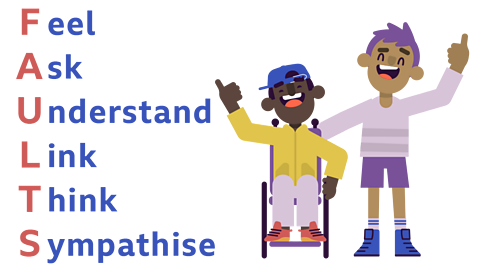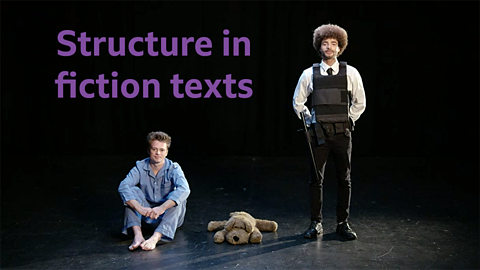What do you know?
Which of the words below are synonyms for the word 'effect'?
A. Consequence
B. Impact
C. Influence
All of them!
Everything we do in life is about effect. Every action has a consequence, every word we use has an impact, every decision we make can influence our future.
Introduction to exploring effect on the reader
Key learning points
When reading a text look at:
- how a writer's words create an effect
- what consequences the words have have
- how those words influence a reader's emotion and understanding
Video about exploring effect on the reader
A video about how the language and techniques a writer uses can create effect on the reader which is dependent on the reader's context
How does language choice create meaning? Writers often craft their work to stimulate emotional reactions from readers.
One piece of writing might create an ominous, tense atmosphere which might make a reader feel anxious or scared.
Another might make the reader feel joyous, elated, euphoric…
The ‘effect’ is the feeling or mood conveyed by the writer’s language choices.
Writers rely on a shared understanding with the reader, for example the symbolic use of red, meaning danger or love. But writers can’t guarantee a certain response from all readers. People’s interpretations of a text will depend on their own context or life experience.
But what triggers a reader's feelings? Does the writer use metaphor and simile to make comparisons? Do they use alliteration to draw attention to certain phrases? Or sibilance to create a sinister mood?
A writer might want to create a sense of joy, excitement or sadness. They might want the reader to feel a sense of grief, optimism or despair.
Where a painter would use colour, tone and shade to build atmosphere, or a musician would use different chords and harmonies, a writer uses language. Their words are then interpreted by us as readers. The feelings we have in response to a text are the effect.
What is an effect?
An effect is something that happens as a result of something else.
For example:
- If it rains (cause) we get wet (effect).
- If we eat lots of sugar (cause) our teeth might get cavities (effect).
The effect of something is dependent on its cause – it can be positive or negative.
What is a reader?
When we talk about the effect on a reader, we mean the effect of a writer’s words on the person reading the text. But who is the reader?
You
Firstly, you! You are the person reading the text, so you are the person being affected by the words on the page. Being able to describe the effect of language on you is essential in analysing writing and a writer’s craft.
General readers
Consider readers in general. People can share lots in common with one another so it is possible to write about the likely effect on the general reader of a piece of text, particularly fiction or a poem.
Specific readers
A reader will have a personal response and there will be a likely general response, but it is also worth considering what specific groups of people might feel in response to the words of a writer. Think about different groups in society: different ages, cultures, locations, races, religions, genders.
Contemporary readers
Readers who read a writer’s work at the time it was published are called contemporary readers. Think about what people at the time might have thought about the writer's words, and how this might differ to a modern reader's views. Often this viewpoint can give you an interesting perspective on the effect on readers in general.
Describing feelings
The primary effect of words are feelings. This is because words carry meaning that is often personal and specific to us. A word means something different to an individual depending on their context, background, culture, experience, and many other factors.
Feelings can be hard to pin down. Look at the word bank below and explore how it breaks down feelings into more specific ideas - becoming more intense as each column is filled. These can be useful when discussing your feelings about a text.
| Starting emotion | More specific | More intense | Most intense |
|---|---|---|---|
| Sad | Upset | Devastated | Distraught |
| Angry | Furious | Enraged | Apoplectic |
| Interested | Curious | Intrigued | Fascinated |
| Frightened | Anxious | Alarmed | Terrified |
How to explain effect
One way to explain the effect of a writers’ words is to choose a precise verb to make the effect clear.
Here are some examples of verbs that can really help with explaining effect in a handy acronym FAULTS.
Feel
Ask
Understand
Link
Think
Sympathise
By working through these verbs you can really unpick the effect of language in detail, adding layers of analysis to your comments and writing.

For example, a student might write about the following line of Wilfred Owen’s poem Dulce et Decorum Est using the FAULTS verbs:
Bent double, like old beggars under sacks.
Owen uses the phrase, ‘bent double’ to describe the soldiers. Immediately the reader might ask what has happened to these men to have caused them to become doubled over. The simile of ‘old beggars’ helps us understand just how damaged the soldiers are. The men are also described as being ‘under sacks,’ which makes us sympathise with the soldiers because sacks make us think of heavy weights. Overall we feel alarmed at the shocking image of pain and suffering presented to us.

Select the correct verb to complete the explanation of the effect on the reader of the line from Dulce et Decorum Est by Wilfred Owen.
Towards our distant rest began to trudge.
Owen describes the soldier’s rest as being ‘distant.’ This makes the reader feel / understand / think sorry for the soldiers as they have to travel before they can feel safe.
The verb 'trudge' helps the reader link / understand / feel that the conditions in which the soldiers are travelling in are horrendous. This onomatopoeic verb makes us link / think / feel about mud and wet ground, with sticky ground clinging on to their boots.
Owen describes the soldier’s rest as being ‘distant’. This makes the reader feel sorry for the soldiers as they have to travel before they can feel safe.
The verb ‘trudge’ helps the reader understand that the conditions in which the soldiers are travelling in are horrendous. This onomatopoeic verb makes us think about mud and wet ground, with sticky ground clinging on to their boots.
Test your knowledge
Play Bitesize secondary games. gamePlay Bitesize secondary games
Have fun playing science, maths, history, geography and language games.

More on Critical reading
Find out more by working through a topic
- count8 of 11

- count9 of 11

- count10 of 11

- count11 of 11
